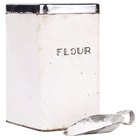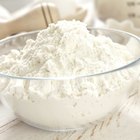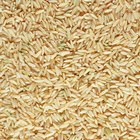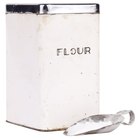
Food can be spoiled because of microbial growth, pest infestation or oxidation. While flour is usable for longer than many foods you find around the kitchen, it eventually reaches a point where it is no longer edible. Know the signs of spoiled flour and proper storage techniques to ensure safe consumption.
Whole Wheat Flour Vs. White Flour
White flour takes a lot longer to spoil than whole wheat flour. Whole wheat flour retains essential oils not found in white flour, which can cause it to turn rancid over time. This makes identifying spoiled whole wheat flour easier than spoiled white flour. Spoiled whole wheat flour will produce has a rancid smell and should be discarded immediately.
Shelf Life of Flour
The shelf life of flour, or the amount of time it takes for flour to spoil, depends on a number of factors including the type of flour and the way it is stored. White flour has a shelf life of 6 to 12 months if stored properly outside of the refrigerator. Stored in the refrigerator at 40 degrees Fahrenheit, white flour lasts for up to 2 years and can be kept indefinitely if stored in the freezer. Whole wheat flour, on the other hand, will only last 1 to 3 months outside of the refrigerator, 6 months in the refrigerator and up to 12 months in the freezer, assuming it is properly stored.
Proper Storage
Flour, whether white or whole wheat, must be properly stored to prevent premature spoilage. Always use an air tight container properly sized for the amount of flour you want to store. You may need to convert pounds to cups when purchasing a container. A pound of flour is equal to 4 cups of flour. Keep the container in a cool, dark place such as a cupboard or pantry. To store flour in the freezer, use airtight bags. Remember to return flour to room temperature before using it.
Pests
Flour is susceptible to a number of pests that feed on it or use it as a nursery. According to to the University of Nebraska Lancaster County Cooperative Extension, pests commonly found in flour include Indian meal moth, dermestid beetles, flour beetles and weevils. These pests can chew into unopened flour packaging, which is another reason why you should store flour in airtight containers. An infestation is indicated by the presence of tiny beetles, moths, worms or larvae.
Related Articles

Does Flour Expire?

Does it Help to Keep Flour in the ...

How to Store Flour

How to Store Flours & Grains Without ...

What Is Amaranth Flour?

Does Flour Get Old or Go Bad?
How to Keep Flour for Long-Term Storage
How Long Can Flour Be Stored in Mylar ...

Can You Use Musty Smelling Flour?

How to Store Oat Bran

How Long After a Sell-By Date Can You ...

How to Substitute Cornstarch for ...

How to Roast Chickpea Flour

Is Teff Flour Gluten-Free?

What Is Stone-Ground Wheat?

Can You Eat Expired Mayonnaise?

How to Store Bulk Flour & Sugar
Methods of Long-Term Food Storage for ...

How to Get Rid of Mold in a Gym Bag

How to Replace Flour With Oat Flour
References
- Washington State University’s Clark County Extension: Food Safety & Nurtrition - Cleaning Out The Kitchen Cupboard
- University of Nebraska Lancaster County Cooperative Extension: Cleaning The Kitchen Cupboard - Can This Food Be Saved?
- University of Nebraska Lancaster County Cooperative Extension: Managing Pantry Pests
- Utah State University Cooperative Extension: How Old Is Too Old?
Writer Bio
Charlie Higgins is journalist, editor and translator based in Buenos Aires, Argentina. He has written for a variety of lifestyle and niche market websites, including International Food Trader, The Olive Oil Times, microDINERO, Sounds and Colours, Connecting Worlds and The Buenos Aires Reader.
Photo Credits
Hemera Technologies/Photos.com/Getty Images